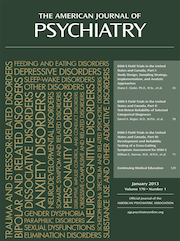Current Status of Co-Occurring Mood and Substance Use Disorders: A New Therapeutic Target
Abstract
Mood and substance use disorders commonly co-occur, yet there is little evidence-based research to guide the pharmacologic management of these comorbid disorders. The authors review the existing empirical findings, some of which may call into question current clinical pharmacotherapy practices for treating co-occurring mood and substance use disorders. The authors also highlight knowledge gaps that can serve as a basis for future research. The specific mood disorders reviewed are bipolar and major depressive disorders (either one co-occurring with a substance use disorder). Overall, findings from the relatively small amount of available data indicate that pharmacotherapy for managing mood symptoms can be effective in patients with substance dependence, although results have not been consistent across all studies. Also, in most studies, medications for managing mood symptoms did not appear to have an impact on the substance use disorder. In a recent trial for comorbid major depression and alcohol dependence, combination treatment with a medication for depression and another for alcohol dependence was found to reduce depressive symptoms and excessive drinking simultaneously. However, research has only begun to address optimal pharmacologic management of co-occurring disorders. In addition, current clinical treatment for alcohol and drug dependence often excludes new pharmacotherapies approved by the U.S. Food and Drug Administration for treating certain types of addiction. With new data becoming available, it appears that we need to revisit current practice in the pharmacological management of co-occurring mood and substance use disorders.



